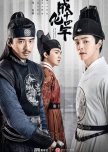
The Sleuth of Ming Dynasty
15 mensen vonden deze beoordeling nuttig
Deze recentie kan spoilers bevatten
For those of you concerned about the injected 'romance' overshadowing the bromance - don't. A lot of you probably know, the original novel story is a male/male storyline. To make dramas pass China's censorship test, many such adaptations get converted to bromance, or worse, swapped out entirely for a male/female storyline.Even though there are signs of romance in some early eps, it doesn't go anywhere at all. The 'love interest' becomes mostly a background character. The bromance game (and honestly, they do start to hint at romantic or at least domestic undertones) comes in pretty satisfyingly in the latter half.
The relationship between Tang Fan and Sui Zhou does progress quite gradually and rather realistically (not our usual schtick of cdramas writing milestone relationship developments like 'ML saved FL once; checkpoint in relationship reached! Now their attitudes are suddenly different towards each other'.
Pros:
- Production value is pretty great. No super fake cherry blossoms or blatant CGIs always flashing in front of you. Certainly helps to have money.
- Storyline is pretty good; the cases are fun
- All the characters were well-written and likeable and / or interesting. No one felt one-dimensional.
- Action scenes are great of course, given Jackie Chan's guidance. For once, cdramas have somewhat physics-bound and believable action scenes
- Acting was pretty decent. I was initially a bit jarred by Sui Zhou's accent (actor has a Taiwanese accent, which is entirely outside of historical context), but grew accustomed to it. He's got such a nice voice.
- Plenty of bromance drama to be had, but kept within realistic boundaries. Tang Fan did not suddenly turn into a typical cdrama female lead and have predictable collapsing fits or anything silly like that.
- Dong 'er! That little girl is too smart for her own good. As expected of Tang Fan and Sui Zhou's daughter.
Cons:
- Pacing of scenes and camera angles are a bit weird sometimes, but it also got better later on I think.
- Injection of random female character(s) for censorship's sake, but it's a loss I'll take I guess.
Vond je deze recentie nuttig?

Deze recentie kan spoilers bevatten
Exploring the themes of The Untamed (looking beyond the BL / Bromance)
This review is way overdue. I've just watched it the second time and appreciate it even more.I'm not going to talk about the BL / Bromance aspects of it, not because I don't love it, but because I think it's already well covered by all the other reviews and comments. Instead, I would urge non-BL / Bromance fans to look past the production value and nominally BL / Bromance label of this drama and appreciate the well-crafted story that has intricately woven themes of morality, good vs. evil, and exploration of various human psyches. (NOTE: All quotes are paraphrased from memory because I'm lazy..)
Good vs. Evil - The oldest theme in human history, and as of late, we've certainly seen more explorations of dubious morality. Obviously the biggest representative of this is Wei Wuxian, our 'anti-villain' / 'hero.' From WWX stepping in to help various peers during the campaign against Wens, to when he saved the Wens, there's a constant question of what is good vs. evil. Sure, Wen Ruohan and Wen Chao are pretty standard 'bad guys', but they are not the primary plot point. Instead, the more important plot point was the treatment of the Wens after the fact. And subsequently, WWX himself. The drama / novel is constantly questioning what is right and what is wrong, and you can see the gradual descent into gray morality through the lens of the righteous Lan Zhan's interactions with WWX. The other aspect of this is that everything is always multifaceted. At the end of the day, no one is fully good or evil. A person can be good to one person, and evil to another. Jin Guangyao's speech at the end sheds a lot of light on this theme. He's done many terrible things, but the one thing he's never done is intentionally harm Lan Xichen, because he truly does love / respect him.
Righteousness - From the top of the hierarchy to the bottom, every single person beats their chests in righteousness. Obviously, the biggest commentary on this is that all these people scream righteousness when it's convenient for them. They leveraged WWX's abilities when it was in their favor, and screamed righteousness when it wasn't. But what I love more about this story is that *every* character has made mistakes over this, including WWX. The cultivation public screaming righteousness over killing WWX is ironic, but what's more subtle is the commentary on WWX's own mistakes in righteousness. Although it's certainly not his fault that the Wens decided to massacre his sect, and it's not his intent to have murdered Jin Zixuan, the fact is that he might have been a cause. This was mirrored in his remark to Wen Zhuliu, the core-shattering bodyguard of Wen Chao's, when he asked the latter, 'Why does your desire to repay kindness [to the Wens] require other innocents to pay?' Even though Wen Zhuliu stays by Wen Chao's side in a righteous desire to repay a kindness, his actions do bring harm to other innocents. Another foil to all of this is of course the story of Xiao Xingchen and Song Lan. They were the epitome of righteous and upstanding, and certainly no one (sane) can blame them for the tragedy that unfolded. Yet reality is a bitter world and this drama showcased very well that your intent to do good will not always be repaid in kindness.
Mob justice - The is extremely critical given China's cultural background. China, and other Asian countries, is a very community -oriented and also hierarchical culture. Deference is woven into the language itself, and so the impact of peer judgment, pressure, and the stakes of position in hierarchy are greatly heightened. Throughout the drama, you constantly see random side characters or strangers making comments. Part of it is to give way to narration and share information with the audience while keeping them fully immersed, but part of it is to illustrate the toxicity and lethality of the mob mentality. Wen Qing's farewell to him basically sum it up. "Whether or not you actually cast the curse is no longer important. They've already determined you to be the perpetrator. It doesn't matter if you even have evidence that you're *not* the perpetrator. They'll find an excuse anyway." The lesson here is that opinions, especially those of a mob, can have very real and very drastic consequences.
Cycle of power, corruption of power - Although the first half of the drama consists of the battle agains the Wens, who are your typical bad, the more important conflict is what follows. And I love that they portray the multiple cycles of power here, and show that it isn't just one person, or one clan, but the position that ultimately 'corrupts'. And they showcase this not just through the 'viillain's like Wen family and Jin Guangyao, but a little bit through WWX himself. Although WWX's intentions were always pretty good and certainly more fair than the other two's, the fact is that he also grew too confident in his ability to control a situation.
Self-serving bias and hypocrisy - This is laughably apparent in all the mob justice mentality. And WWX of course directly pointed all of this out in his monologue atop the roofs of Nightless City. When someone used underhanded tactics to surprise attack him, and then he in return killed the person, the mob once again cried injustice. And he remarks through angry tears, "Why do you not ask who instigated this?" and goes on to finally remark, "Oh I understand now. If you attack me, it's justice. If I in return defend myself by attacking back, it's a crime." Some more subtle moments reflecting this theme, are when Jin Guangshan makes up excuses to retain Xue Yang's life. "Who personally saw him commit these crimes, hm?" which is a stark contrast to when they were persecuting the remnants of the Wen clan, and said "Just because no one saw them commit the crimes, doesn't mean they didn't!" And of course reiterated in WWX's monologue where he snubbed to an outspoken bystander, "Well if you're claiming I can't prove I'm not the perpetrator, what about you? What evidence do you have that you're not the perpetrator?"
Difference in human psyches - What I love most about the drama / story is how well fleshed out all the characters are. WWX's character is most obvious to us, given he's the main. However, Lan Zhan's gradual development of his morals through his understanding of and interactions with WWX is brilliantly gradual. Given his personality, you can fully see how his mind works. And this isn't limited to the 'good' guys. Both Jin Guangyao and Xue Yang, although they can be considered villains, are disturbingly real in their motivations and way of thinking. Both of them clearly lack a form of empathy and value their own well-being entirely over those of others. While they are irrational, we can see how they formed their logical basis for making all the decisions they did.
Privilege - Privilege is also a huge theme here, as highlighted by Jin Guangyao's speech at the end. Both him and Su She were not born to privilege, and so way people treated them from the get go were different. For Jin Guangyao, even though he shares the same father as Jin Zixuan, one son was favored and the other was kicked down the stairs. Even if this doesn't excuse any of them of their crimes, the fact remains that they had to endure more hardships than people like Jin Zixuan and the Lan brothers. Any respect, they had to claw to keep. And of course, a bit more subtle relation here is WWX's usage of the demonic arts. Ultimately, the theme here is, if people have the ability to choose, who wouldn't choose the 'proper' path? Who in their right mind would intentionally choose the criminal path?
Satisfaction with the unknown - Finally, there is a lesson in letting go of the need to know everything. You're never going to find all the answers in life, and a lot of times, you're not going to know a person completely.
Honestly, there are so many good lessons and examples here, but I'm trying not to write an analysis essay here. While I *love* the romance and relationship development between Lan Zhan and Wei Wuxian, I think focusing on just that is grossly undervaluing the drama. I've not really seen another drama with such a good balance of characters, story plotline, and story themes.
Vond je deze recentie nuttig?


